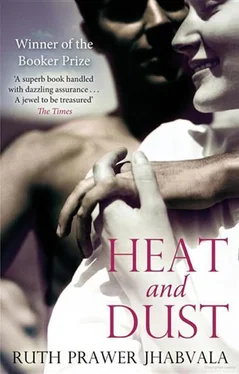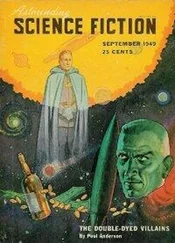Of course at that time the marble angel had been new and intact — shining white with wings outspread and holding a marble baby in its arms. Now it is a headless, wingless torso with a baby that has lost its nose and one foot. All the graves are in very bad condition — weed-choked, and stripped of whatever marble and railings could be removed. It is strange how, once graves are broken and overgrown in this way, then the people in them are truly dead. The Indian Christian graves at the front of the cemetery, which are still kept up by relatives, seem by contrast strangely alive, contemporary.
1923
Olivia had always been strongly affected by graveyards.
In England too she had liked to wander through them, reading the inscriptions and even sitting on a grave stone under a weeping willow and letting her imagination roam. The graveyard at Satipur was especially evocative.. Although Satipur had always been a small station for the British, quite a few of them had died there over the years; and bodies were also brought in from other districts with no Christian cemetery of their own. Most of the graves were of infants and children, but there were also several dating from the Mutiny when a gallant band of British officers had died defending their women and children. The newest grave was that of the Saunders' baby, and the Italian angel was the newest, brightest monument.
The first time Olivia saw this baby's grave, it had a powerful effect on her. That evening Douglas found her lying face down across their bed; she had not allowed the servants to come in and open the shutters, so the room was all closed in and stifling and Olivia herself bathed in tears and perspiration.
"Oh Douglas," she said, "what if we have a baby?"; and then she cried: " Yes and what if it should die! "
It took him a long time to soothe her. He had to forget his files for that one evening and devote himself entirely to her. He said everything he could think of. He told her that nowadays babies did not die so often. He himself had been born in India, and his mother had had two other children here and all of them had thrived. It was true, in the old days a lot of children did die — his great-grandmother had lost five of her nine children; but that had been a long time ago.
"What about Mrs. Saunders' baby?"
"That could have happened anywhere, darling. She had complications — or something-"
"I'll have complications. I'll die. The baby and I both.” When he tried to protest, she insisted: "No, if we stay here, we'll die. I know it. You'll see." When she saw the expression on his face, she made an effort to pull herself together. She even tried to smile. She put up her hand to stroke his cheek:
"But you want to stay."
He said eagerly "It's just that it's all new to you. It's easy for the rest of us because we all know what to expect. But you don't, my poor darling." He kissed her as she lay there resting against his chest. "You know, I'd been talking about this very thing with Beth Crawford. (No, darling, you mustn't think that way about Beth, she's a good sort). She knew before you came how difficult it would be for you. And you know what she said after you came? She said she was sure that someone as sensitive and intelligent as you are — you see she does appreciate you, darling — that you would surely be… all right here. That you — well, this is what she said — that you'd come to feel about India the way we all do. Olivia? Are you asleep, darling?"
She wasn't really but she liked lying against his chest, both of them shrouded within their white mosquito net. The moon had risen from behind the peach tree and its light came pouring in through the open windows. When Douglas thought she was asleep, he hugged her tighter and could hardly stifle a small cry — as if it were too much happiness for him to have her there in his arms, flooded and shining in Indian moonlight.
Next day Olivia went to visit Mrs. Saunders. She took flowers, fruit, and a heart full of tender pity for her. But although Olivia's feelings towards Mrs. Saunders had changed, Mrs. Saunders herself had not. She was still the same unattractive woman lying in bed in a bleak, gloomy house. Olivia, always susceptible to atmosphere, had to struggle against a feeling of distaste. She did so hate a slovenly house, and Mrs. Saunders' house was very slovenly; so were her servants. No one bothered to put Olivia's pretty Rowers in a vase — perhaps there was no vase? There wasn't much of anything, just a few pieces of ugly furniture 'and even those were dusty.
Olivia sat by Mrs. Saunders' bedside and listened to her tell about her illness which was something to do with her womb. It had never got right after the baby's death — this was the only mention of the baby's death, for the rest it was all about the bad after-effects on Mrs. Saunders' health. While she talked, Olivia had the unworthy thought that the Saunders really were not — were not — well, no one ever said this outright but they were just not the sort of people usually found in the Indian services. Olivia was by no means a snob but she was aesthetic and the details Mrs. Saunders gave about her illness were not; also Mrs. Saunders' accent — how could one help noticing with her droning on and on? — was not that of a too highly educated person….
I'm base, base, Olivia scolded herself — but at that moment she had a shock for Mrs. Saunders gave a loud shout: turning round, Olivia saw that one of the slovenly servants had come in, wearing slovenly shoes. It was these latter that had upset his mistress — and of course it was a mark of disrespect for a servant to enter a room with shoes on, Douglas would never have allowed it to happen in their house. But Olivia was amazed and frightened by the strength of Mrs. Saunders' reaction. She had sat up in bed and was shouting like a madwoman. 'She called the servant a dirty name too. The servant was frightened and ran away. Mrs. Saunders Sank her head down on her pillow in exhaustion, but her outburst was not over yet. She seemed to feel the need to express or perhaps justify herself; she may have been ashamed of the dirty word that had escaped her. She said that these servants really were devils and that they could drive anyone crazy; that it was not stupidity on their part — on the contrary, they were clever enough when it suited their purposes — but it was all done deliberately to torment their masters. She gave examples of their thieving, drinking, and other bad habits. She told Olivia about the filth in which they lived inside their quarters — but of course what could one expect, everything was like that, everywhere the same — the whole town, the lanes and bazaars, and had Olivia ever looked inside one of their heathen temples? Mrs. Saunders groaned and she covered her face with her hands and then Olivia saw that tears came oozing through her fingers and her chest inside her nightgown was heaving with heavy sobs. She brought out "I've asked him — over and over — I've said: Willie, let's go."
Olivia stroked Mrs. Saunders' pillow and now her tears were flowing too, in pity for someone so unhappy.
What a relief, after that, to be with bright, brisk Beth Crawford! She had come to invite Olivia to accompany her to Khatm, to pay a call on the Nawab's mother. Olivia loved visiting the Palace again, even though this time they were ushered straight into the ladies' quarters. These were also very elegant, though more in Indian style with floor-level divans covered in rich textures, and little mirrors in enamelled frames. Three good European chairs had been arranged in the centre: these were for Mrs. Crawford and Olivia, and for the Begum herself. There were some other, mostly elderly ladies and they reclined on the divans spread on the floor. The younger ladies floated around in diaphanous silks and served sherbet and other refreshments from a succession of trays carried in by servants.
Читать дальше












